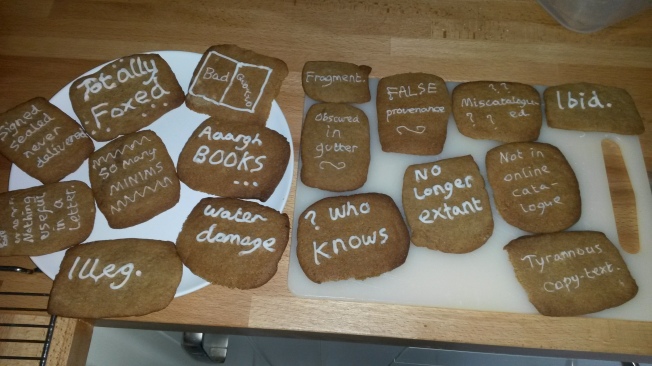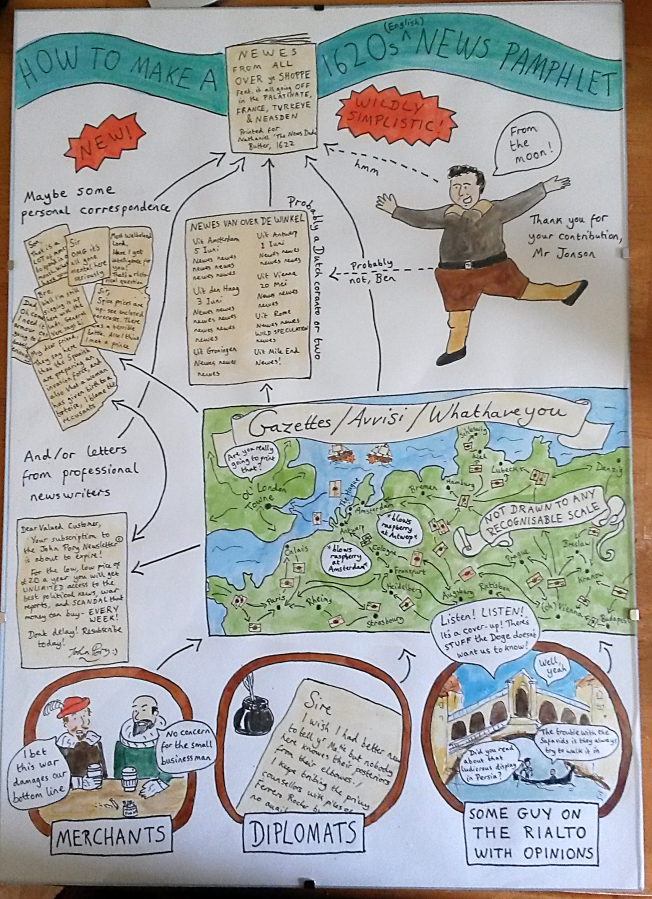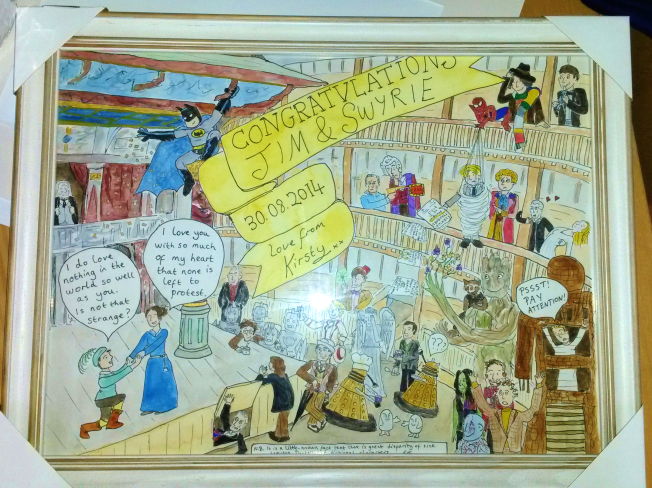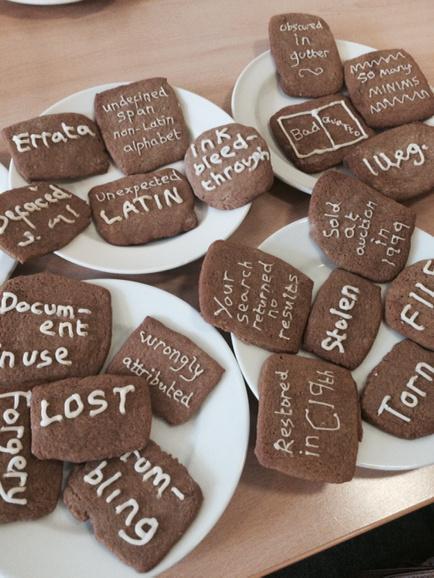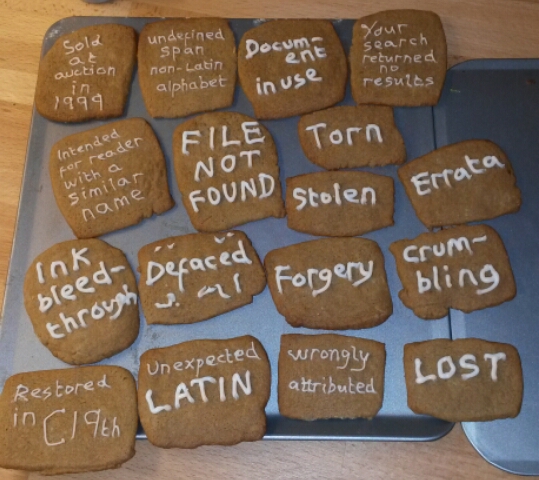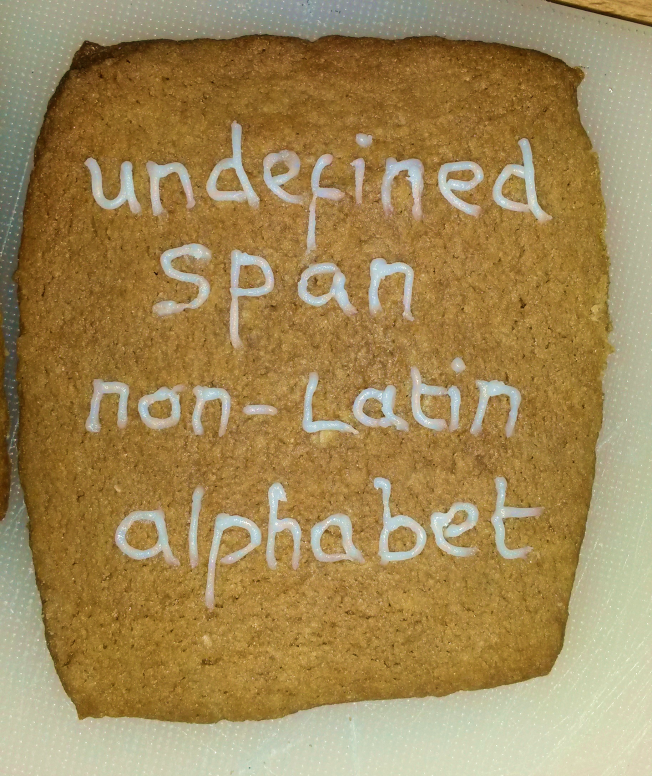– Or, how accepting praise graciously rather than turning it into a mangled psychodrama will make you a better scholar –

The other night a friend of mine – let’s call her Bob, because that is not her name – gave her second conference paper. She’s only in her first year of her PhD, so this is pretty impressive. I’ve read and been a test audience for both papers, and both have been smart, fascinating, and well-argued. I didn’t make it to the seminar at which she was presenting because I was on the sofa eating soup and weird throat lozenges that come in little orange test tube thingys and look like Rennies, but it seems that this paper was, like the first, well-received. I only know this, though, because when I asked her how it went she smiled and said, ‘Y’know – people are nice’.
People are nice? People are NICE, Bob? I’m sure people are, but more importantly, how about ‘My paper was good and they liked it, as well they should’?
This sort of deflection – ‘it’s not that I did a good thing, it’s that people were nice to me about it’ – seems very common in the academic circles I move in. I know I’ve done it myself a good few times. It tends to look like false modesty, and perhaps it is, sometimes and for some people. I think for many, though, the modesty is real. A lot of us are terrible at taking compliments, and tend to deflect nice comments or questions onto someone or something else – the material we work on, a critic we’ve used, or indeed the questioner’s own good nature.1
Question is – when someone does this, are they just trying not to seem boastful (protesting too much, naturally), or do they genuinely believe that the reason for the praise they’re receiving for their paper (or indeed their thesis, seminar, article, etc – I’m focusing on conference papers here but much of my argument could be applied to other areas of endeavour) somehow lies outside of the work they’ve done? The first of these must surely be unnecessary – you’re not exactly skywriting ‘I’m Brilliant’ over the conference centre or naming your kids after your thesis chapters2 – and the second is, frankly, bullshit. Egregious bullshit, that insults your audiences and/or readers as much as it insults yourself.

People are nice, but also your paper is good, Bob, and these two things are not mutually exclusive. You are confusing niceness (the niceness that all reasonable academics and indeed human beings display, in which you listen carefully to the person presenting their research, and ask questions in a polite and interested way, and do not shoot down the first-year PhD student because that’s a horrible thing to do, and pour her a nice glass of wine afterwards) with condescension. Everyone has a right to expect this kind of niceness in an academic forum (though, admittedly, your question mileage may vary). Condescension, on the other hand, is a dick move practised by dicks and it is not what your audience were doing when they listened carefully and then asked questions and did not shoot you down. People are nice, and part of being nice is informing someone when they are on the wrong track, or have a hole in their argument that needs filling, or have grasped the wrong end of the stick. If your paper had any of these problems, someone would probably have raised it in the questions, or (more likely if you’re a PhD student) taken you aside afterwards and had a quiet word. No one did this? Everyone said it was good? Then you gave a good paper, suck it up.
‘Niceness’ has its dangers. Karen Kelsey (aka The Professor) has written several hugely helpful blogposts at The Professor is In (see here and here – seriously, go and read them) about the problems that can arise when advisors and other fellow academics are too ‘nice’ to spell out the truth to those who need to hear it. It’s also true that giving a paper as a graduate student (particularly if you’re in your first or second year) is unlikely to garner you really cutting, no-holds-barred criticism – because yes, people are too nice to spring that on a graduate student, at least unless they’re a. rather unpleasant, or b. certain that said graduate student can hold their own in this fight. On top of that you have the usual problems with presenting a paper – some of the audience might have been thinking about their dinner or the chapter they’re writing, or staring out of the window or at the woman in front’s shoes.
But they did choose to come to see you, and regardless of what they might have been doing you have to pay them the courtesy of assuming that they listened, and thought about what you said, and responded in ways they considered appropriate. No-holds-barred criticism is what a supervisor is for. The fact that you didn’t get it after your paper is not an indication that audience members were holding back out of niceness, but that criticism is phrased and presented differently in such a forum.
This is crucial. Attentive audience members will usually express criticism in a constructive way, but they will probably express it, and it is absolutely one of the best things they can do. It’s incredibly useful to be alerted to a hole in your argument, or a resource you should look at, or indeed informed that the whole of what you’ve just said is bunkum. It’s what you present papers for, CV points be damned. A lot of the time criticism doesn’t mean that you’ve done a bad paper in the slightest – it means that there are other areas into which you can expand and develop your research. And that it got people talking. Someone cared enough to disagree with you! That doesn’t happen when you’re on your own in the Rare Books Room.3
Back to my original point, though. It’s important to take criticism, but I’d argue that it’s important to take praise, too – and that you should consider both as constructive feedback. The praise of others in our disciplines is a perfectly reasonable end in itself – these are the people we’re supposed to be impressing and networking with – and can help you trace the success or otherwise of your work. Saying, in effect, that an audience or reader only claimed to like your paper because they’re ‘nice’ dismisses the judgement of the very people who you asked to judge your work. As an academic you need to trust both your own intellectual judgement and that of your peers; not implicitly, as at times you may need to choose between the two, but with the confidence both to choose your own path and to consider others’ comments carefully and critically. Dismissing praise treats neither your work nor the responses it elicits with the right levels of respect and thoughtfulness. Privately, it can adversely affect both your work and your attitude to it. If you dismiss praise publicly, people might just become less willing to praise you.

It’s also a mistake, I think, to ignore or downplay the emotional role that praise can play. I might not want to consider myself as basically a puppy, being trained to do stuff with praise and titbits of food, but the fact that I instituted ‘Sacred 3pm Cake Time’ during revision for my finals suggests otherwise. Being praised for your work makes you feel good about it, and you should not pass up any opportunity to feel good about your work, because there will be times – many times, horrible times – when you don’t feel good about it. PhDs go on for a reasonable length of time4 and most of that is spent on your own, reading or writing or staring at a computer screen making inarticulate mewling noises. Accepting praise from other people is like putting jam5 in your porridge. You may (wrongly. I mean, it’s fruit!) feel it detracts from the healthiness of the endeavour, but without the jam you are not going to want to eat all that oatmeal. You can tell I’m ill because I’m actually a bit proud of that tenuous analogy.
Praise also (um, unlike jam) helps you to orientate yourself in regard both to your field and to what’s expected of you as a graduate student. A frequent PhD-student complaint is of isolation – not just social isolation (though there’s a fair deal of that) but isolation from the structures that guided us earlier in our careers. We don’t get graded any more, and that’s a bit scary. Particularly given that the academic year above mine (to which Bob belongs, incidentally) trailblazed their way through primary and secondary education as (at that point) the most frequently examined students in British history. Most of us grew up being ceaselessly graded and evaluated throughout school and university, and it’s difficult – especially if your grades tended to be good – to let go of that as a means of evaluating our own achievement. How can we know we’re doing well if no-one’s giving us A’s for it? How can we know if our interventions in a field are up to the standard of other practitioners? The only way to gauge this is to present our work in some way to said practitioners, and to ask them to consider it on a professional level. And if we’re doing that, we have to be professional about how we respond to the feedback we receive. Even if it’s good and we’re embarrassed.
My point is, Bob: maybe6 there are ways in which your paper could be improved, and no-one told you about them at the seminar. But you can’t know about this, because no-one told you. And instead they said nice things, which might be related to you being a graduate student and them being nice, but they said them about the paper, which suggests – them being clever people and all – that they thought the paper was good. So – and I’m going to say this very clearly, and put it in bold:
Chalk this one up as a win.
1. I do wonder slightly if this is a British thing – passive-aggressive faux-modesty is part of the British stereotype, and I have been told by various Americans that British academics seem less willing than US ones to talk about their work in social situations – but this seems rather too pat and, well, stereotypical. I’d appreciate any thoughts from non-Brits on the matter! I suppose this is also stereotypically ‘female’ behaviour, and both Bob and I happen to be female – but I really haven’t noticed any difference between the genders here.↩
2. Or someone else’s kids, which is definitely going a bit far.↩
3. Where you just have to disagree with yourself. Or Pollard and Redgrave.↩
4. I wanted to write ‘a long time’ but I’m in my third year so I couldn’t bring myself to.↩
5. Substitute for flavouring of your choice. Even if you’re Scottish, and that flavouring is salt.↩
6. Probably. This is academia we’re talking about.↩
